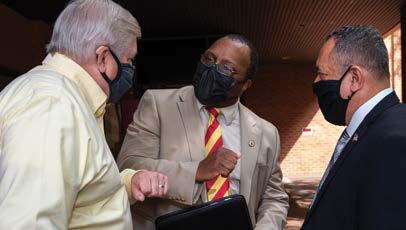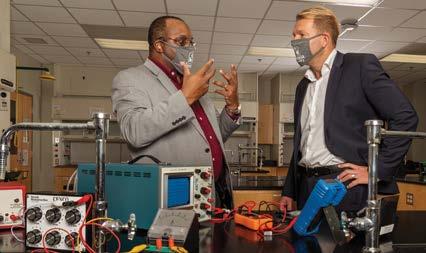
5 minute read
FEATURE |
Alvernia students Leah Kemper ’21 (left) and Brett Berger ’22 (right) explore lab equipment with EnerSys Senior Vice President and Global CTO Joern Tinnemeyer (center).
ENGINEERING CHANGE
By Claire Curry
Alvernia's Reading CollegeTowne strategy, launched in 2019 to advance the university and play a part in Reading’s economic revitalization efforts by fusing academia with commerce, is building solid traction. In addition to the purchase and $20 million renovation of 401 Penn St., the site of Alvernia's new downtown campus, several new programs are making it possible for students to gain marketable skills, the process of business entity formation and trademarking. Another team worked with a pre-revenue client to implement a digital marketing campaign. Fellows on the O'Pake Institute's Intellectual Property Committee use cutting-edge IP software to create IP portfolios for clients in the business incubator.
“The O'Pake Institute is addressing the multiple needs of emerging businesses by creating a whole ecosystem to build professional networks and have a strong hand in breathing magic back into a city that many have grown up loving.

Alvernia President John R. Loyack announces the addition of three engineering programs at a press conference at Alvernia’s new downtown Reading location.
Student Fellows lift local businesses
Through the O'Pake Institute for Economic Development & Entrepreneurship, more than 20 student fellows are engaged in real-world problem-solving on projects that have already started fueling local businesses.
Currently, O'Pake fellows are working with more than 50 companies on a variety of projects ranging from social media campaigns to developing licensing agreements to creating industry playbooks. One team assisted a client through support them, while enhancing our students' learning,” said Alvernia Senior Vice President and Provost Glynis Fitzgerald. “The students gain tangible skills and the businesses benefit from receiving services they wouldn't otherwise be able to pay for. The O'Pake Institute puts all the different pieces together for success, whether it's a new business, a business trying to grow or a business trying to navigate through the COVID-19 environment.”
Electrical, Industrial and Mechanical Engineering
Alvernia's new engineering program will likewise provide students with hands-on training in electrical, mechanical and industrial engineering, leading to offering Reading's robust manufacturing industry a steady stream of new talent.
The programs weave a strong core curriculum with hands-on experiential learning in state-of-the-art, working labs— experiences made possible through partnerships with local manufacturing corporations, energy suppliers and engineering firms. These partners will likewise benefit from working directly with students whom they may eventually recruit into their workforces.
“Students will be able to engage with industry leaders early in their academic journey,” Fitzgerald said. “It’s mutually beneficial because local companies can recruit the students who love Berks County and want to stay here, and it makes for a smooth pathway for employers to have a direct connection to our university and access to this talent.”
Alvernia’s downtown campus at the newly purchased building at 401 Penn St. will house the O’Pake Institute as well as engineering, business and communications programs and provide additional student housing. Renovation of the 260,000-sq.-ft. building is underway, with the first phase to be completed by August 2021.
The engineering curricula will follow standards set by the Accreditation Board for Engineering and Technology and will be the same for all engineering students—electrical, mechanical and industrial—through the sophomore year.
“What’s exciting is that all students will have training in all three disciplines so they can see what interests them and then select the discipline that really appeals to them,” said Rodney Ridley, associate provost and vice president and chief operating officer of the O'Pake Institute. Ridley, who holds a doctorate in engineering science and a master’s in electrical engineering from Penn State University, as well as a bachelor’s in physics from Lincoln University, helped lead the formation of the engineering programs.
Engineering students will also have opportunities to conduct applied research with faculty and other students through the O'Pake Institute, “where business ideas can be brought to commercialization,” explained Ridley.
Brian Czaus, a freshman who is currently working as an engineering fellow at the Institute, plans to enroll in the new engineering program next year. “I like working with my hands and solving problems with my mind,” he said, adding that he is looking forward to pursuing the interest he developed in engineering as a high school sophomore.

Dr. Rodney Ridley (middle) shares updates about Alvernia’s engineering programs and Reading CollegeTowne with Berks County Commissioner Christian Y. Leinbach (left) and City of Reading Mayor Eddie Moran (right).
Long term, the university will look to expand the engineering programs to consider master’s degrees in mechanical engineering, bioengineering/biomedical engineering, civil engineering and chemical engineering, as well as concentrations, certifications and minors in areas such as computer engineering, cybersecurity, AI & VR and robotics.
Fitzgerald said it makes sense to “look for synergies between Alvernia’s academic programs,” and particularly, to explore interdisciplinary opportunities at the intersection of health care and engineering.
Meeting the region’s demand for qualified engineers
The engineering programs are Alvernia’s answer to the manufacturing industry’s call for qualified engineers in the greater Reading area.
“We formed an Engineering Advisory Board and conducted outside studies, and it became clear that there is a strong demand for these programs that also align perfectly with Alvernia’s Reading CollegeTowne Strategy,” said Ridley.

Dr. Rodney Ridley (left) shares thoughts on Alvernia’s engineering programs with EnerSys Senior Vice President and Global CTO Joern Tinnemeyer (right).
Several organizations are partnering with Alvernia to deliver this new educational model. Among them is EnerSys, an international leader in stored energy for industrial applications. Headquartered in Reading, EnerSys has offices worldwide, customers in 100 countries and a workforce of 11,000.
Senior Vice President and Global CTO Joern Tinnemeyer said the partnership couldn’t be more timely because of the increasing demands for smarter energy source devices, wireless charging and highly customized energy systems.
“This requires significantly more engineering than we’ve ever had before,” he said. “Having this relationship with Alvernia allows us to develop a curriculum around what we need and to provide training on the new systems we’re developing. When students graduate, they will be ready to go. They will have skills that are future proof and higher-paying job opportunities, and we will have a [steady] channel of talent coming in.”
Brentwood Industries, a leading provider of engineered plastic headquartered in Reading, and another partner in the new engineering programs, will also open its doors to students for hands-on learning experiences.
“Not only will Alvernia’s strategy produce more engineers, it will connect students and faculty with our R&D facilities and staff to provide a great educational experience,” said President and CEO Peter Rye.
Other organizations serving as industry partners in the engineering programs include UGI Utilities, East Penn Manufacturing, Custom Processing Services, SSM, Carpenter and Mitsubishi Chemical Advanced Materials, among others. In addition to informing curricula and providing state-of-theart facilities for hands-on learning, these business leaders will serve as adjunct professors and student mentors.
Ridley views the Reading CollegeTowne initiative—including the O’Pake Institute, the new engineering programs, the business partnerships and Alvernia’s new downtown campus— as “a catalyst for change in Reading, Berks County and the greater southeastern Pennsylvania region.”

